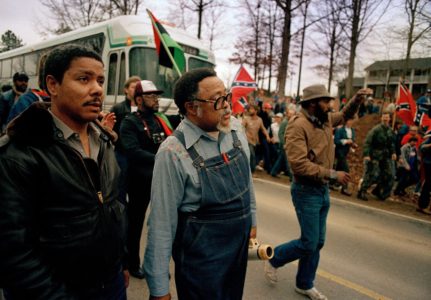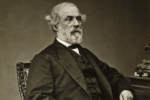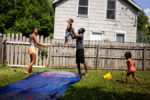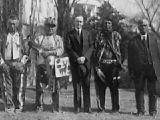 Featured – “Do You Think You’re Not Involved?” The Racial Reckoning of “Blood at the Root.” By Casey Cep / The New Yorker
Featured – “Do You Think You’re Not Involved?” The Racial Reckoning of “Blood at the Root.” By Casey Cep / The New Yorker
“Blood at the Root” likewise reads like an archetype: not only of how a memoir can transcend the personal to become a study of politics and place but also how a scrupulous account of the past might prepare us to look more honestly at the present. A national reckoning cannot only involve looking elsewhere, any more than it can only involve looking at others. It must necessarily include looking at where we live, especially for those of us who are white, and considering more carefully the question that Natasha Trethewey asked Patrick Phillips more than a decade ago: “Do you think you’re not involved?” Read more
Related: Call It White Supremacy. By Charles M. Blow / NYT
 Putting Heroes, and Traitors, Where They Belong. By The Editorial Board / NYT
Putting Heroes, and Traitors, Where They Belong. By The Editorial Board / NYT
African-Americans were nonpersons in the eyes of the state when the federal government started to name U.S. Army installations for Confederate officers. Black people in the South were being lynched with impunity for such offenses as seeking the vote, competing with white people in business or simply failing to give way on the sidewalk. Shown is Robert E. lee. Read more
Related: Woodrow Wilson Was Even Worse Than You Think. By Colin Woodard / TPM
 Why Trump’s White Grievance Message Strikes a Sour Note in the Suburbs. By Katie Glueck / NYT
Why Trump’s White Grievance Message Strikes a Sour Note in the Suburbs. By Katie Glueck / NYT
As the president casts himself as a bulwark against “angry mobs,” there are signs that he is alienating voters in bedroom communities who view him as a deeply flawed messenger on issues of race. Read more
 The Case for Elizabeth Warren. The former front-runner is still the best candidate for Black Americans. By Julia Craven / Slate
The Case for Elizabeth Warren. The former front-runner is still the best candidate for Black Americans. By Julia Craven / Slate
Where most of the Democratic presidential field supported racial justice and progressive ideals in general terms, palatable to a mainstream audience, Warren offered a platform specifically and explicitly designed to aid Black Americans in overcoming the consequences of racism. Alleviating inequality, particularly as experienced by Black people, was at the root of Warren’s policy proposals, in a way few of her well-meaning opponents could match. Read more
Related: The woman Biden should pick to lead us to calmer days. By George Will / Wash Post
 A new generation challenges the heartland. By Tim Craig and Aaron Williams / Wash Post
A new generation challenges the heartland. By Tim Craig and Aaron Williams / Wash Post
The number of young people of color living in the Midwest has surged over the past decade, as the older white population has nearly stalled. Forty percent of the nation’s counties are experiencing such demographic transformations — a phenomenon fueling the Black Lives Matter protests that have swept the country and forced racial reckonings in communities, colleges and corporations nationwide. Read more
 Racism in care leads to health disparities, doctors and other experts say as they push for change. By Tonya Russell / Wash Post
Racism in care leads to health disparities, doctors and other experts say as they push for change. By Tonya Russell / Wash Post
Related: Study of Coronavirus in Pregnant Women Finds Striking Racial Differences. By Katherine J. Wu / NYT
Related: Covid-19 led to more Black deaths because of housing discrimination. By Dylan Scott / Vox
 The Hidden Racism of Vaccine Testing. By Laura Stark / New Republic
The Hidden Racism of Vaccine Testing. By Laura Stark / New Republic
Who were those people who served in the riskiest studies for the first vaccine against a new virus? Sociologist Jill A. Fisher does ask, in her new book, Adverse Events, and the answers she gets from first-in-human test subjects show how systemic anti-Black racism in the United States maintains the clinical trials industry and how the industry circles back to hold people of color disproportionately in positions of economic precarity. Read more
 In-depth look at the lack of diversity in mental health professionals. By Kate Snow / NBC News
In-depth look at the lack of diversity in mental health professionals. By Kate Snow / NBC News
According to the American Psychological Association and American Psychiatric Association, just 4 percent of psychologists in the U.S. are Black, and only 2 percent of psychiatrists are Black. NBC News’ Kate Snow reports on what’s being done to change that. Watch here
 Could This City Hold the Key to the Future of Policing in America? By Joseph Goldstein and
Could This City Hold the Key to the Future of Policing in America? By Joseph Goldstein and
Related: Don’t stop with the police: Check racism in the prosecutor’s office. By Rachel Cicurel / Wash Post
 What the ‘black-on-black crime’ fallacy misses about race and gun deaths. By Shirley Carswell / Wash Post
What the ‘black-on-black crime’ fallacy misses about race and gun deaths. By Shirley Carswell / Wash Post
My social media timelines of late have been filled with outrage over the police killings of unarmed black citizens, but after a violent Fourth of July weekend around the nation that left several children dead, I noticed an uptick in snarky posts asking: “What about black-on-black crime? Why aren’t you protesting about that?” Read more
 The Supreme Court’s big Native American rights case, McGirt v. Oklahoma, explained. By Ian Millhiser / Vox
The Supreme Court’s big Native American rights case, McGirt v. Oklahoma, explained. By Ian Millhiser / Vox
McGirt asks whether a significant swath of land covering the eastern half of the state of Oklahoma is part of what federal law anachronistically refers to as “Indian country” — that is, Native American reservations where tribal governments retain considerable sovereign authority. The holding of McGirt is that this land, which has 1.8 million residents, most of whom are not Native American, is reserved land. Oklahoma must honor a treaty from nearly two centuries ago setting aside this land for Native peoples. Read more
 A racial reckoning arrived at West Point, where being black is a ‘beautifully painful experience.’ By Alex Horton / Wash Post
A racial reckoning arrived at West Point, where being black is a ‘beautifully painful experience.’ By Alex Horton / Wash Post
 I’m a black CEO. I’ve been discounted on Wall Street because of my skin color. By Eddie C Brown / Wash Post
I’m a black CEO. I’ve been discounted on Wall Street because of my skin color. By Eddie C Brown / Wash Post
I was raised in the Jim Crow South, when the railroad tracks separated whites from blacks and African Americans were considered second-class citizens. I began my investment career as the first African American portfolio manager at T. Rowe Price in 1973, not because of some quota or the good graces of white executives, but because the meritocratic model made me visible and managers were supportive. After 10 years in the business, I became an entrepreneur. Read more
 Joy Reid Takes Nightly Anchor Slot at MSNBC. By Michael M. Grynbaum / NYT
Joy Reid Takes Nightly Anchor Slot at MSNBC. By Michael M. Grynbaum / NYT
Joy Reid, who rose to television fame as a sharp critic of President Trump and commentator on liberal politics and race, will become the host of a new nightly show on MSNBC, the network announced on Thursday, placing her among a handful of Black women to anchor an American evening news program. Read more
 Kennedy Center to commission anti-racism works, expand programs for black artists and audiences. By
Kennedy Center to commission anti-racism works, expand programs for black artists and audiences. By
Lots of people, especially many Native Americans, loathe the name of the Washington, D.C., NFL team, the Redskins. “The origin of that name is rooted in murder and violence and genocide and hate,” says Crystal Echo Hawk, the founder and CEO of the advocacy group IllumiNative. “It’s a dictionary-defined racial slur, full-stop.” Read and listen here
Visit our home page for more articles, book/podcast and video favorites. And at the top of this page register your email to receive notification of new editions of Race Inquiry Digest. Click here for earlier Digests.
Use the buttons below to share the Digest in an email, or post to your Facebook, Linkedin or Twitter accounts.
 The Racial Justice Reckoning Over Sports Team Names Is Spreading. By Frank Morris / NPR
The Racial Justice Reckoning Over Sports Team Names Is Spreading. By Frank Morris / NPR